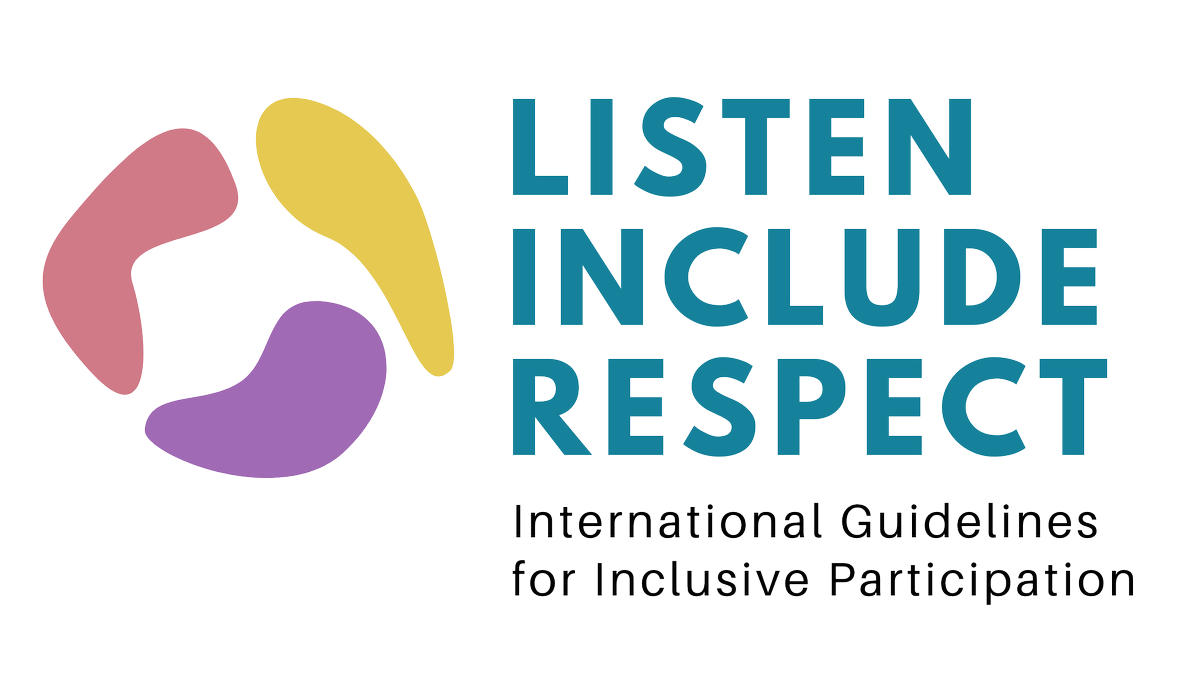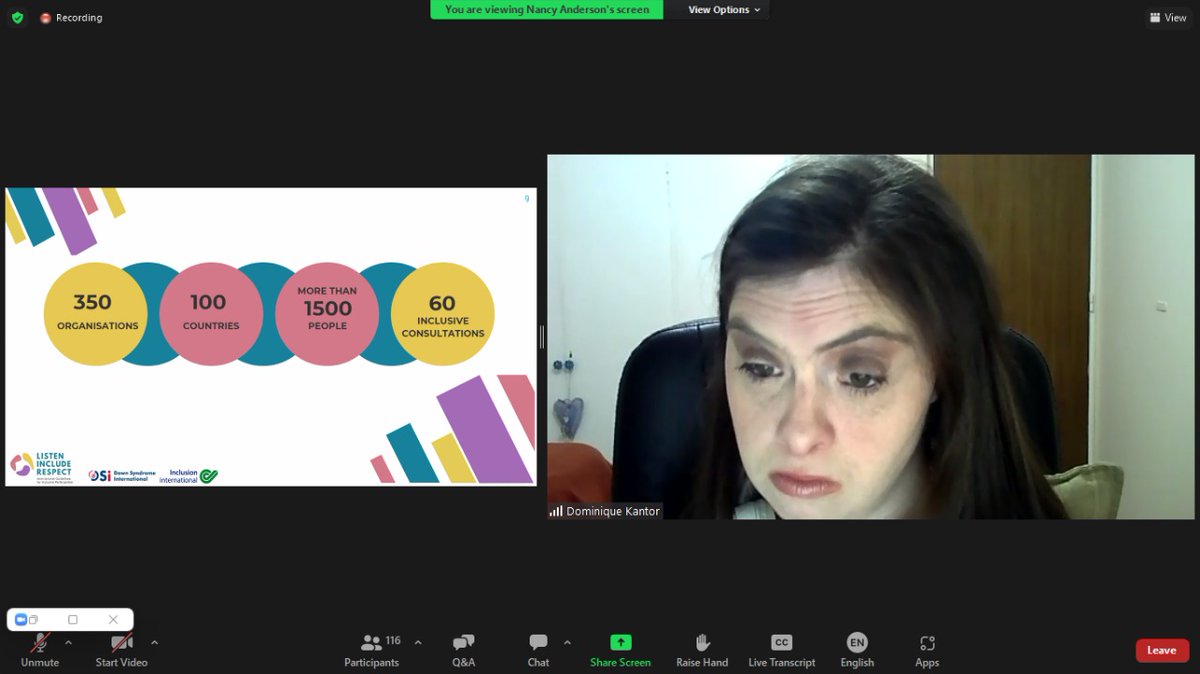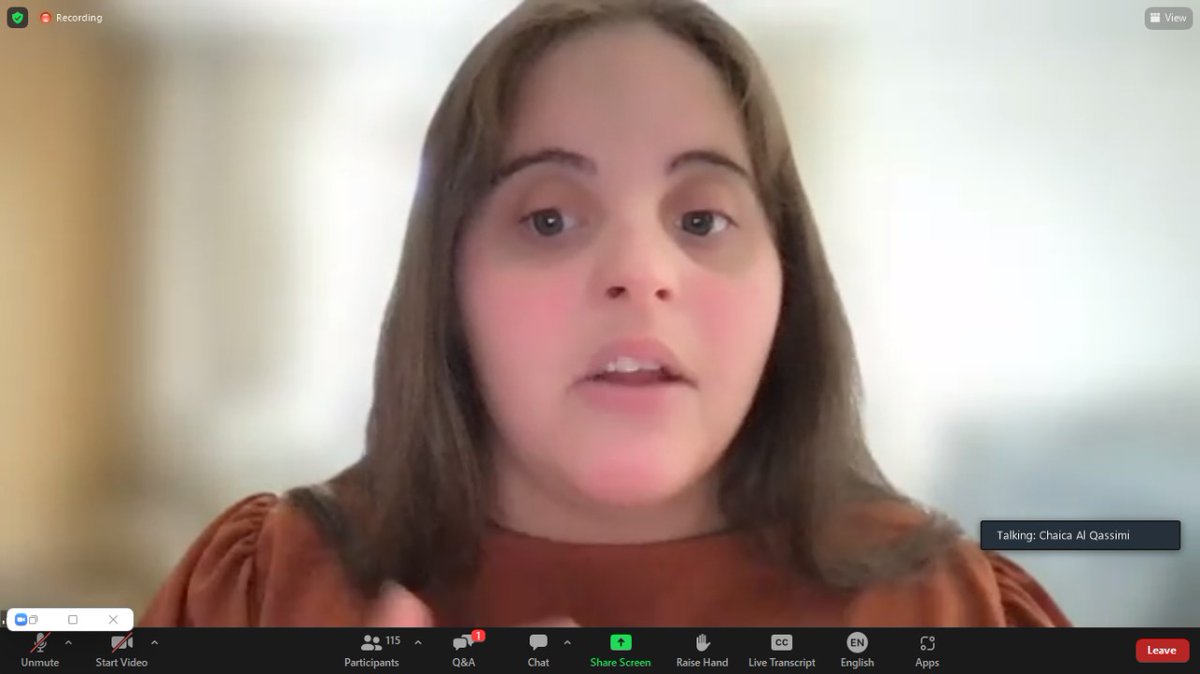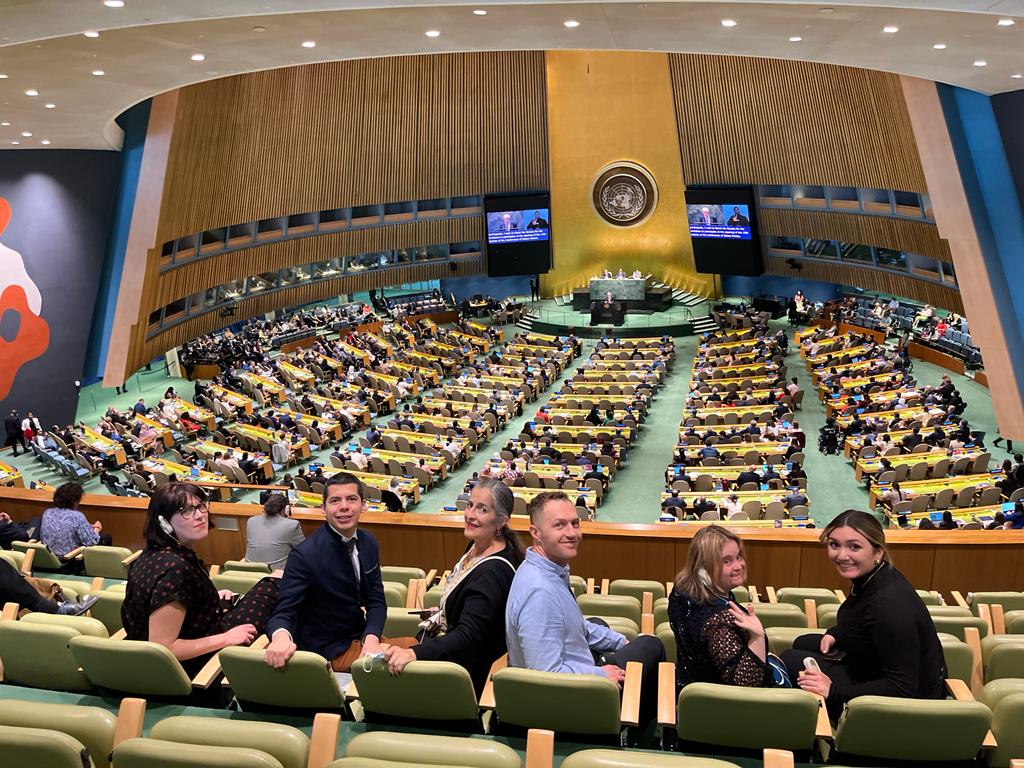
🔴We're live! Our #COSP side-event to launch the draft Listen Include Respect guidelines is happening now!📢
We'll be live-tweeting key points throughout the side-event - follow this thread for key points and resources below.
👇
We'll be live-tweeting key points throughout the side-event - follow this thread for key points and resources below.
👇

Chaica al Qassimi, self-advocate from Inclusion International and @DSiupdate and a part of the team who developed #ListenIncludeRespect, opens the #COSP side session. 

Shiva Shrestha of the @InclusionIntl Council and @pfpid makes opening remarks for the #ListenIncludeRespect launch:
"Listen Include Respect - these words are very important for people with intellectual disability to be properly heard."
"Listen Include Respect - these words are very important for people with intellectual disability to be properly heard."
Shiva Shrestha of the @InclusionIntl Council and @pfpid:
"When we talk about inclusiveness, this is the main question - we, people with intellectual disability, are also human beings. We must and should be included in all programmes." #ListenIncludeRespect
"When we talk about inclusiveness, this is the main question - we, people with intellectual disability, are also human beings. We must and should be included in all programmes." #ListenIncludeRespect
Shiva Shrestha of the @InclusionIntl Council and @pfpid:
"In Nepal, people with intellectual disabilities were not included within the disability movement or within organizations. But now, we are changing this - this is the result of our self-advocacy" #ListenIncludeRespect
"In Nepal, people with intellectual disabilities were not included within the disability movement or within organizations. But now, we are changing this - this is the result of our self-advocacy" #ListenIncludeRespect
Shiva Shrestha of the @InclusionIntl Council and @pfpid:
"We are left out - we must raise our voices and be strong associations of self-advocates. We must highlight our key principles of #ListenIncludeRespect"
"We are left out - we must raise our voices and be strong associations of self-advocates. We must highlight our key principles of #ListenIncludeRespect"
Kayla McKeon of @NDSS, also the first registered lobbyist with Down Syndrome in the USA, takes the floor:
"We want to be listened to, valued, and respected for our unique perspectives & experiences we bring to the table. #LIR guidelines will help organizations be more inclusive"
"We want to be listened to, valued, and respected for our unique perspectives & experiences we bring to the table. #LIR guidelines will help organizations be more inclusive"
Kayla McKeon of @NDSS: "You can be the changemaker - make sure you listen, include and respect in your organization. People with intellectual disabilities have so much to offer the world - we just need the change to have our voices heard" #ListenIncludeRespect 

Ambassador Tetsuya Kimura of Japan shares opening remarks at the #ListenIncludeRespect launch:
"We are pleased to co-sponsor this #COSP15 side event, which aims at sharing international guidelines for inclusive participation of people with intellectual disabilities"
"We are pleased to co-sponsor this #COSP15 side event, which aims at sharing international guidelines for inclusive participation of people with intellectual disabilities"

Ambassador Tetsuya Kimura of Japan:
"This event provides us an excellent opportunity to reflect on what is needed to remove barriers - the new guidelines will help people with intellectual disabilities take part in activities in a meaningful way" #ListenIncludeRespect
"This event provides us an excellent opportunity to reflect on what is needed to remove barriers - the new guidelines will help people with intellectual disabilities take part in activities in a meaningful way" #ListenIncludeRespect

Self-advocate @dominiquekanto1 of @fvisibilia:
"All over the world, communities, & organizations do not know much about intellectual disability is. That is the root problem for the discrimination & lack of support. This is why #ListenIncludeRespect is necessary."
"All over the world, communities, & organizations do not know much about intellectual disability is. That is the root problem for the discrimination & lack of support. This is why #ListenIncludeRespect is necessary."

Self-advocate @dominiquekanto1 of @fvisibilia, part of the team that built #ListenIncludeRespect, shares the process for developing the guidelines:
👏 350+ organizations contributed
👏 feedback from over 100 countries
👏 more than 1,500 individuals gave input
👏 60+ focus groups
👏 350+ organizations contributed
👏 feedback from over 100 countries
👏 more than 1,500 individuals gave input
👏 60+ focus groups

Self-advocate @dominiquekanto1 of @fvisibilia:
"Organizations need to have the courage to make a change" #ListenIncludeRespect
"Organizations need to have the courage to make a change" #ListenIncludeRespect
.@tianelis1 of SABE introduces the panel who will be discussing #ListenIncludeRespect:
📢@VpGabo of @AsdownColombia and @InclusionIntl
📢Mark Mapemba, Vice President of @InclusionIntl
📢Eli Moldovan of @CevaDeSpus and EPSA
📢@VpGabo of @AsdownColombia and @InclusionIntl
📢Mark Mapemba, Vice President of @InclusionIntl
📢Eli Moldovan of @CevaDeSpus and EPSA
Eli Moldovan of @CevaDeSpus answers the question "what are some of the barriers you have experienced at #COSP?"
"Speakers go quickly and use words that are difficult to understand. People with intellectual disabilities at the conference, but do not understand what is happening."
"Speakers go quickly and use words that are difficult to understand. People with intellectual disabilities at the conference, but do not understand what is happening."
Eli Moldovan of @CevaDeSpus on barriers at #COSP:
"There is only a very short time for self-advocates to speak - we need more time, especially if we need translation" #ListenIncludeRespect
"There is only a very short time for self-advocates to speak - we need more time, especially if we need translation" #ListenIncludeRespect

.@tianelis1 asks - "What ideas do you have to make #COSP more inclusive?
Eli of @CevaDeSpus: "It is important to have pictograms before the conference - we need information to get in the room"
Eli of @CevaDeSpus: "It is important to have pictograms before the conference - we need information to get in the room"
Eli of @CevaDeSpus: "And it is very important to have people with intellectual disabilities as speakers at #COSP, even if we might make mistakes. We might need just an 5 extra minutes. We will also need support persons to help make things easy to understand" #ListenIncludeRespect
Mark Mapemba, Vice President of @InclusionIntl on how to make #COSP more inclusive:
"Organizers need to be well prepared to share information with self-advocates and people with intellectual disabilities. The information must all be easy to understand."
"Organizers need to be well prepared to share information with self-advocates and people with intellectual disabilities. The information must all be easy to understand."

Mark Mapemba, Vice President of @InclusionIntl on how to make #COSP more inclusive:
It is good to use the #ListenIncludeRespect guidelines because then it would be easy to understand, everyone would share information in advance, and we can understand what everyone is saying."
It is good to use the #ListenIncludeRespect guidelines because then it would be easy to understand, everyone would share information in advance, and we can understand what everyone is saying."
Mark Mapemba on #COSP:
"Sometimes you are in a meeting and the Chair or the speakers don't use accessible language - it is not easy to understand, and we sit in a room and don't understand a word of what is going on. They need to brief their Chairs"
"Sometimes you are in a meeting and the Chair or the speakers don't use accessible language - it is not easy to understand, and we sit in a room and don't understand a word of what is going on. They need to brief their Chairs"
.@VpGabo of @AsdownColombia and @InclusionIntl on accessibility barriers at #COSP:
"Sometimes presentations don't have easy to understand language, pictures, or any visual aids. This can be a barrier. They need to prepare documents in a way that are easy to understand"
"Sometimes presentations don't have easy to understand language, pictures, or any visual aids. This can be a barrier. They need to prepare documents in a way that are easy to understand"
.@VpGabo of @AsdownColombia and @InclusionIntl on accessibility barriers at #COSP:
"I also suggest shorter text, easy to understand and translate words. The idea is to be straight forward and direct - with easy to understand paragraphs" #ListenIncludeRespet
"I also suggest shorter text, easy to understand and translate words. The idea is to be straight forward and direct - with easy to understand paragraphs" #ListenIncludeRespet
.@VpGabo: "Another problem with #COSP is the schedules - there needs to be flexibility to give a little extra time to self-advocates when it is our turn to speak. If there are questions or things we don't understand we need to be able to ask for things to go slower or clarify" 

Chaica al Qassimi on #COSP:
"An easy read agenda was available this year but it was still long and not easy to use. Side events also are not accessible - @UN needs to send the LIR guidelines to everyone doing side events. It isn't fair to us if we can only go to a few things"
"An easy read agenda was available this year but it was still long and not easy to use. Side events also are not accessible - @UN needs to send the LIR guidelines to everyone doing side events. It isn't fair to us if we can only go to a few things"

.@tianelis1 on barriers at #COSP:
"Getting materials ahead of time would make it easier for people to understand what is being presented, and it would be easier to make decisions about what sessions we want to go to" #ListenIncludeRespect
"Getting materials ahead of time would make it easier for people to understand what is being presented, and it would be easier to make decisions about what sessions we want to go to" #ListenIncludeRespect

.@tianelis1 on barriers at #COSP:
"The forms to register need to be easy, and we need to know who to go to get support with registration. Also, people shouldn't use acronyms unless you tell us what they mean and what they stand for" #ListenIncludeRespect
"The forms to register need to be easy, and we need to know who to go to get support with registration. Also, people shouldn't use acronyms unless you tell us what they mean and what they stand for" #ListenIncludeRespect
.@PriscilleGeiser of @IDA_CRPD_Forum on #ListenIncludeRespect:
"IDA has invested in the guidelines because it is important to support inclusion & participation as one of the most underrepresented groups. They flag important preconditions to facilitate inclusion"
"IDA has invested in the guidelines because it is important to support inclusion & participation as one of the most underrepresented groups. They flag important preconditions to facilitate inclusion"

.@PriscilleGeiser of @IDA_CRPD_Forum on #ListenIncludeRespect:
"They will take time to implement, but it is critical to develop this work because of the lack of visibility and representation of people with intellectual disabilities, including within the disability movement"
"They will take time to implement, but it is critical to develop this work because of the lack of visibility and representation of people with intellectual disabilities, including within the disability movement"

Tracy van Gough of @Sightsavers on #ListenIncludeRespect:
"Programming that is fully inclusive is not a sure thing, and it isn't always easy to ensure full participation. We have more to do to include everybody"
"Programming that is fully inclusive is not a sure thing, and it isn't always easy to ensure full participation. We have more to do to include everybody"
Tracy van Gough of @Sightsavers on #ListenIncludeRespect:
"We know from our own experience how important inclusion is - not just because it's linked to the #SDGs and leaving no one behind, because it's the right thing to do"
"We know from our own experience how important inclusion is - not just because it's linked to the #SDGs and leaving no one behind, because it's the right thing to do"

Tracy van Gough of @Sightsavers on #ListenIncludeRespect:
"I'm delighted that self-advocates are in the lead, as it should. As allies, we are happy to provide support and will work alongside you in this process"
"I'm delighted that self-advocates are in the lead, as it should. As allies, we are happy to provide support and will work alongside you in this process"
Tracy van Gough of @Sightsavers on #ListenIncludeRespect:
"The guidelines will help us do our jobs better - if we are serious about disability inclusion, we can't say we are doing that if we are still leaving people at the back of the queue"
"The guidelines will help us do our jobs better - if we are serious about disability inclusion, we can't say we are doing that if we are still leaving people at the back of the queue"

Alex Cote on #ListenIncludeRespect:
"I work on social protection - a very complicated topic. We used LIR to help us produce material on social protection in easy read. We saw that self-advocates gained important knowledge to prepared them to take part in important conversations"
"I work on social protection - a very complicated topic. We used LIR to help us produce material on social protection in easy read. We saw that self-advocates gained important knowledge to prepared them to take part in important conversations"

Alex Cote of @UNICEF on #ListenIncludeRespect:
"When we say we are consulting with persons with disabilities, it needs to be ALL person with disabilities and that might require going the extra mile. The #LIR guidelines are a good resource for us to know how to do that"
"When we say we are consulting with persons with disabilities, it needs to be ALL person with disabilities and that might require going the extra mile. The #LIR guidelines are a good resource for us to know how to do that"

Alex Cote of @UNICEF on #ListenIncludeRespect:
"No more excuses - now it is our turn. It will take time, but we need to create the conversation about inclusion at all levels so that step by step it becomes part of the usual way we plan meetings and make documents"
"No more excuses - now it is our turn. It will take time, but we need to create the conversation about inclusion at all levels so that step by step it becomes part of the usual way we plan meetings and make documents"

.@PriscilleGeiser on using #ListenIncludeRespect:
"The guidelines will be a useful tool for @IDA_CRPD_Forum to share with participants and to promote a culture of how we can do things differently from scratch to make this more systemic"
"The guidelines will be a useful tool for @IDA_CRPD_Forum to share with participants and to promote a culture of how we can do things differently from scratch to make this more systemic"

.@PriscilleGeiser on using #ListenIncludeRespect:
"Participation has a positive effect - the more people with intellectual disability can be part of the picture and tell us what is needed to be included, the more people with think about being inclusive"
"Participation has a positive effect - the more people with intellectual disability can be part of the picture and tell us what is needed to be included, the more people with think about being inclusive"
Mark Mapemba closes the #COSP side event on #ListenIncludeRespect:
"The key message I want to share is that organizations who work on disability should be the first ones to use the guidelines - you have a responsibility to include us. Just talk to us to understand how."
"The key message I want to share is that organizations who work on disability should be the first ones to use the guidelines - you have a responsibility to include us. Just talk to us to understand how."

Mark Mapemba, VP of @InclusionIntl: "Take your good examples and share them. Your example will role model to others how inclusion should be done" #ListenIncludeRespect
Mark Mapemba, VP of @InclusionIntl: "People with intellectual disability need to be pushed to the front. We have been excluded too long. You told us you needed advice to understand how to include us - now you have them, so use them! We need your commitment" #LIR
Joao Genesio de Almeida Filho, Deputy Permanent Representative Ambassador of Brazil to the UN, closes the #ListenIncludeRespect session. 

The Listen Include Respect guidelines are now live!
Find guidelines for how to include people with intellectual disabilities in meetings, consultations, communications, projects, employment, and more on our new website:
listenincluderespect.com
Find guidelines for how to include people with intellectual disabilities in meetings, consultations, communications, projects, employment, and more on our new website:
listenincluderespect.com

For the next 6 months, Inclusion International and @DSiupdate will be collecting feedback on your experiences using the guidelines and making edits to make sure they are as useful as possible.
Share your feedback through the form on the website:
listenincluderespect.com
Share your feedback through the form on the website:
listenincluderespect.com

As we continue creating new resources and tools for the #ListenIncludeRespect guidelines in the next 6 months, stay tuned for training modules, video explainers, additional resources, and more!
The draft version of the guidelines are now online here:
listenincluderespect.com
The draft version of the guidelines are now online here:
listenincluderespect.com

Thank you to everyone who participated in our #COSP side session today, and a huge thank you to all of our excellent panelists:
@shake_chaica96 @VpGabo @dominiquekanto1 @tianelis1 @CevaDeSpus @PriscilleGeiser @Sightsavers @UNICEF and more!
listenincluderespect.com
@shake_chaica96 @VpGabo @dominiquekanto1 @tianelis1 @CevaDeSpus @PriscilleGeiser @Sightsavers @UNICEF and more!
listenincluderespect.com
Thank you to the sponsors and co-hosts for this side session on #ListenIncludeRespect:
@Keystone_KHS @DSiupdate @IDA_CRPD_Forum @Sightsavers @JapanMissionUN @Brazil_UN_NY @PLinUN
@Keystone_KHS @DSiupdate @IDA_CRPD_Forum @Sightsavers @JapanMissionUN @Brazil_UN_NY @PLinUN
• • •
Missing some Tweet in this thread? You can try to
force a refresh






